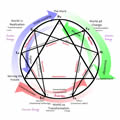Reasons vs. Reasoning
2015-01-14
One of the participants in the online study group had this to say yesterday:
“JG raised a challenging point in today's (13 Jan) session regarding partial or faulty reasoning, that reasoning can be applied for our benefit or detriment and there are several factors that can influence these opposite outcomes. I hope [he] will write a post about his thoughts since some of the distinctions he made seem quite important for bringing 'discriminating wisdom' to the process of understanding our reasoning.
“One distinction that came to my mind was that between reasoning and using reasons. Anyone and everyone who is trying to make a point, influence a buyer, win an argument, or put down another person uses reasons in their process. On the other hand I wonder if the kind of reasoning we are clarifying in group leans toward Reason (more abstract) rather than toward reasons (more concrete). The first seems to evolve toward something more encompassing, while the latter involves into something more material and limited. It may be harder for me to use Reason for my personal ordinary benefit or aggrandizement, but easier to use reasons (whichever specific ones I choose to notice) to serve my individual purpose or agenda versus the benefit of others. So, the question I'm left with is: Could it be that reasoning with Reason helps evolve toward freedom, while reasoning with reasons has the drawback of spiraling us deeper into ego.
“I hope that's not too confused. There's no doubt everybody uses reasons, typically to shore up their bias toward themselves when influencing or persuading others. It will take a while, no doubt, to clarify the way in which the kind of reasoning that leads toward greater freedom is different from the kind of reasoning that strengthens our justifications through reasons. I'm wondering if the difference between abstract Reason and concrete reasons might lie in the difference between wisdom and knowledge.
It seems to me that I would spoil a nicely crafted question by trying to add anything to the above, except perhaps to note that usually having questions is better than having answers.
- John Hutcherson's blog
- Log in to post comments

Comments
hope is unreasonable
what I will say is that what I've been thinking about lately is the quote from Robert Fripp:
"Any reasonable person would look at the state of the world and be liable to despair. But Hope is unreasonable, and Love is even greater than that."
which starts me thinking of different worlds:
world 48 - ordinary automatic reasoning (reasons)
world 24 - higher reasoning (Intelligence / seeing)
world 12 - beyond reason (Hope)
world 06 - Love
and yet peppered throughout Gurdjieff's writings - he constantly refers to the 'degree of Reason' one is currently at or can attain to.
(which gives me the impression that reason goes right up to world 6).